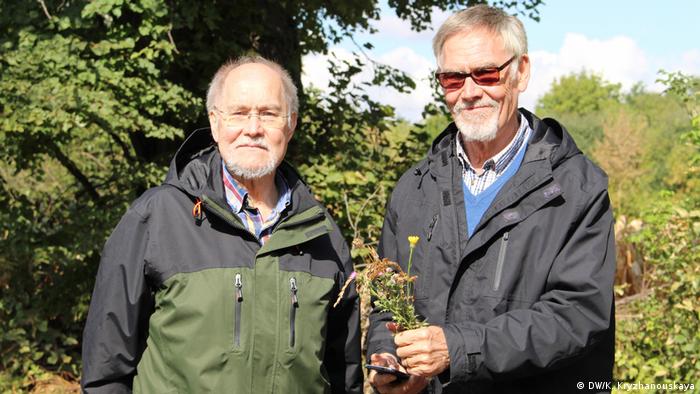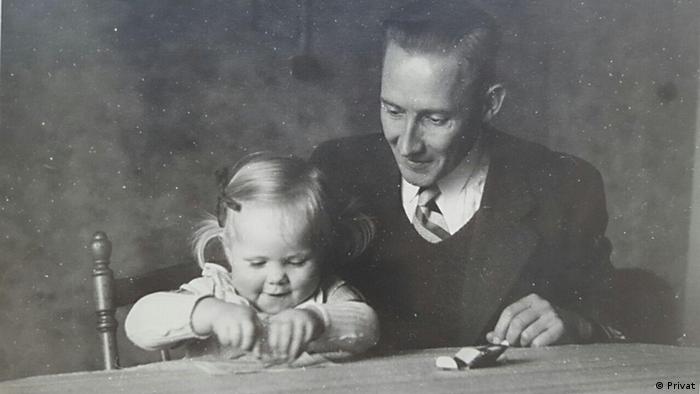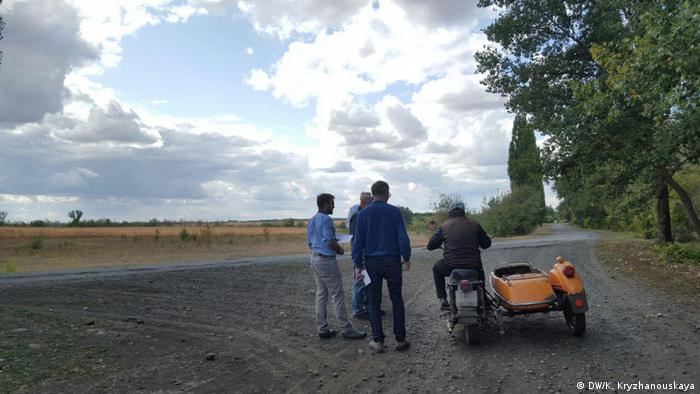The brothers Ulrich and Immo Gleiß can’t remember your father. The officer of the Wehrmacht died in 1943 in the war in the Ukraine. After many decades, you have made the search for his grave.

“Hopefully, our father has done nothing Wrong”, repeated the 77-year-old Ulrich Gleiß (in the article image to the left) again and again. He and his two years older brother, Immo can remember your father George Gleiß hardly. The officer of the Wehrmacht died in September 1943 in the Ukraine. His sons were one and three years old.
The brothers had taken a long time to visit the place where her father is buried. He was involved in the Germany unleashed the Second world war, charged to you. The men are to the Southeast on the way in the Ukrainian province, 300 kilometers from Kiev. They fear that no one will want to speak with the sons of a German officer is.
Diaries of a military officer
Georg Gleiß was born in 1903. Before the war he worked as a teacher, taught French, English and sports. His sons have yellowed letters and diary entries written by her father during the war. This shows that he was as Gasabwehr officer in the use. Of Fighting, he reported nothing. Since he was not allowed to write to his family, where he was encrypted he the place-names. They settled from the initial letters of sentences put together. Therefore, his sons know that he was in a number of places, which are now in Belarus, Russia and Ukraine, including in the Gomel region, in Voronezh, and Kremenchuk.

Georg Gleiß and his daughter Uta
In a letter he reported that the house in which he was together with his driver and the orderlies are housed. The owner of the house, a white Russian, was also a teacher, his wife was from Western Ukraine. The oldest of their three sons fought for 21 years against Germany. The letter of the officer, the family was initially reluctant, but their relationship quickly improved.
On the back of another with a pencil and sheet of paper a command with big letters: “Everyone in the village Schubnoje living persons from 16 years on Wednesday, may 7. November, at 6:15 p.m. on the Church square to arrive. Everyone must bring their passport. The disregard of the command will be punished severely!” Ulrich Gleiß says sadly: “It is clear that the people were not prompted to gather.” If his father gave the command in the village in the Voronezh region, and what happened to the people later on, he does not know.
Search for graves of German soldiers
In September 1943, the family received Gleiß news of the death of the father. A later letter of a comrade of George Gleiß was a map of the area attached to it. On the tomb was signed some 50 metres to the West of a place with the name of Krasne (Name to protect from looters – d. Red amended.). The letter also photos of the funeral were. A wooden cross was to be seen; a General gave a speech. On current maps, the village is not recorded.
The are many clues, says Alexey Savchenko from the office of the Volksbunds German war graves Commission in the East of Ukraine. Together with the Gleiß-brothers, he embarks on the search. The mass graves of German soldiers in the Ukraine, he says, are well documented. In the meantime’m mostly looking for single graves or such, in which several people are buried. But the search is difficult, because there is about it in the archives, very little information and almost all the witnesses had died.

The Gleiß brothers and Alexey Savchenko (R) meet local people
The location of the Krasne found to have, can be determined from the surrounding villages, which are also shown on the old German map. The area appears to be lonely. Impressed by the scenery, from the corn fields and the endless sky, climbing, Ulrich and Immo Gleiß out of the car. You are photographing an abandoned fountain and geese in a pond, as a middle-aged woman comes over. With one Hand she pushes her bike with the other, she leads a cow on a leash. From a village of Krasne, you know nothing. Old people might still know something, admit it no more, she says.

Corn fields in the East of Ukraine
Where the map must be had, according to Krasne, is a cemetery – a new. There can be only since the late 1980s, people beige. While the German pensioners are still studying the card, keeps an old motorcycle with a sidecar. The driver knows nothing about Krasne. He live only for 20 years. However, he calls the “Chairman”, the head of the local administration. Maybe he can help.

The guests from Germany will meet on helpfulness
The support of the local people
The “Chairman” turns out as a big man of about 50 years; his name is Anatoly. He continues with the Gleiß-brothers in his cherry-red Lada and take with you on a spontaneous Tour. “Here is an overgrown clay pit, a former brick factory. If there were shootings, then for sure here. And that’s a reservoir. Here is a German tank to be lost. This is the train station. If Your father was in this area, with security here,” says Anatoly.
Then he gets Famous and she asks if you knew something about a German officer who is supposed to be killed. So come in and more about the life and death of Georg Gleiß to the day.
Occupation by German troops
As it turned out, was “Krasne pole” is the Name of a collective farm, the changed the villages of Berezovka and Derkatschi (name – ed.) heard. Therefore, Krasne was makes it “” on the military map exactly between the two villages, in. During the war the area was occupied by the Germans. Locals say that at the beginning of the occupation, had been shot to death two men because they had boasted of, to be Soviet partisans. Ulrich and Immo the tomb of the men want to see Gleiß. The road is slightly off, a small grey Obelisk.
According to the legend, the Germans have no mass penalty liable to the performed actions. But they had forced the people to loaded fertile black earth, which was then brought to Germany.
Pages
1 |
2 |
full article